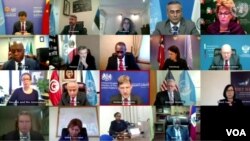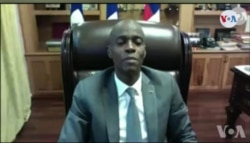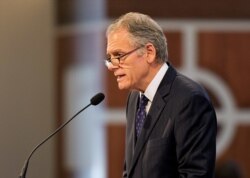The United Nations Security Council has expressed serious concern about Haiti’s worsening political instability and called for elections to be held this year.
Security Council members met by videoconference Monday to discuss a 120-day report prepared by the United Nations Integrated Office in Haiti (BINUH) detailing developments between September 1, 2020, and January 31, 2021, in key areas: political and good governance, violence reduction, security and the rule of law, human rights, unemployment, youth and vulnerable groups, and basic social service delivery and resilience.
Helen La Lime, Special Representative of the U.N. Secretary-General in Haiti and head of BINUH, painted a mostly bleak picture while briefing members.
“As the country prepares to enter a tense pre-electoral period, the polarization that has defined most of President [Jovenel] Moïse’s term in office has become even more acute, as signs of a shrinking civic space abound and an already alarming humanitarian situation continues to deteriorate,” La Lime said.
Describing the human rights situation as “dire,” La Lime cited Moise’s November 26 decree on public security as particularly problematic for civil liberties.
“The overly broad definition of terrorism articulated in a 26 November decree on public security — to include lesser offenses such as vandalism and obstructing roads, along with an increase in both the threats directed at, and attacks on journalists, lawyers, judges and human rights defenders — all risk chilling the public debate and curtailing such inalienable rights as those of freedom of speech, freedom of the press, and peaceful assembly,” La Lime said.
The BINUH chief also criticized Moise’s decree sidelining three Supreme Court justices after announcing an alleged coup attempt — a move that unified the previously divided opposition groups and angered Haiti’s allies in the international community.
Haiti’s response
In an unusual move, President Moise personally addressed the Security Council to defend his policies. It is normally the Foreign Minister who speaks at such meetings.
The president listed his achievements in the energy sector, infrastructure and modernizing Haiti’s police force. He cited progress toward reforming the constitution and organizing a referendum and general elections later this year. He also expressed his commitment to addressing gang violence, kidnappings, human rights abuses and press freedom. But at times, his claims were at odds with BINUH’s report.
“To reinforce the rule of law and consolidate the security agencies in the absence of a functioning parliament, I had to adopt certain decrees that were necessary to combat organized crime, rampant insecurity and kidnapping,“ Moise said in French, pushing back on criticism about ruling by decree.
“I am the fifth president since 1987 to use this tool to respond to the needs of the people. I will continue to do so in a limited fashion until a new parliament is elected and the 59th president of the Republic is sworn in on February 7, 2022,” Moise added.
In response to calls for more inclusivity and encouraging more women and youth to participate in the electoral process, Moise blamed the “radical opposition” and “corrupt oligarchs” for the current state of affairs.
“The fear of elections and the popular vote explains these coup d’etat attempts to install a transitional government bypassing the will of the people,” Moise said. “The results of the previous six elections organized by Haiti show that the majority of these political actors will never pass the 1% bar. The biggest challenge we have is how to build a democracy with actors who are incapable of constructing a coalition to become an alternative [choice]. I won these presidential elections as an opposition candidate who solicited the popular vote.”
U.S. adopts tough stance
But Ambassador Jeffrey DeLaurentis, the Acting Alternate Representative for Special Political Affairs at the U.S. Mission to the United Nations, was unsympathetic.
“Let me begin with something we all know: legislative elections were due in Haiti in October 2019. Both before and after that date, members of this Council repeatedly called on Haiti’s political stakeholders to come together, to set aside their differences, and to find a way forward to address Haiti’s most pressing challenges,” DeLaurentis said. “They chose not to do so; however, ultimate responsibility for creating an atmosphere conducive to free and fair elections, and then conducting those elections, must rest on the government.”
The ambassador also repeated that ruling by decree must end.
“Let me conclude by reiterating the need to bring the current period of rule by decree to a swift conclusion. It is only through the presence of a stable, democratic, and fully representative government that issues such as violence, corruption, and civil and human rights abuses can be meaningfully addressed,” DeLaurentis said.
Moise told the council a constitutional referendum would be held in June — a departure from the April 25 date previously cited in the Provisional Electoral Council’s calendar. He added that legislative and presidential elections would follow in September.
France slams Moise on Human Rights
Nathalie Broadhurst, France’s Deputy Permanent Representative to the United Nations, slammed Moise on human rights and lack of progress investigating gang violence.
“In the terms of security and respect for human rights, the authorities must do more,” she said. “I ask this question straightforwardly: how is it possible today that Jimmy Cherizier [notorious Haitian gang leader] is still walking free? Those responsible for the La Saline and Bel Air massacres must be brought to justice. I also note that the investigation into the assassination of Monferrier Dorval [constitutional law professor and head of the Port-au-Prince bar association] is not making progress. The fight against impunity must be the priority of the authorities.”
China questions continuing U.N. assistance
Describing 2021 as a “watershed moment” for Haiti, China’s Ambassador Geng Shuang questioned if the United Nations should continue its work after investing more than $8 billion over the past 30 years.
“I would like to stress here again that there is no solution to the Haitian problem from the outside,” Shuang said. “We should learn the lessons, comprehensively assess the situation in light of what is happening, ponder seriously on the future presence of the U.N. in Haiti, and avoid endless and fruitless investment.”
Margaret Besheer contributed to this report.







